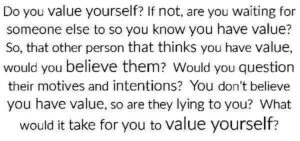 How do you decide if you have value or not?
How do you decide if you have value or not?
The current state of this area: deciding on your value is abysmal… and keeps you anxious, worried, and not happy.
You always think that your understanding is the correct understanding of reality.
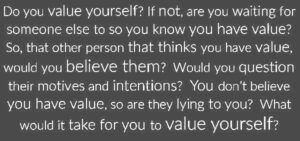 You think you understand what people say, what people mean.
You think you understand what people say, what people mean.
You never consider that your understanding is based on your small picture of reality… and you never think to grow your picture of reality. You never think to ask something new.
This is most visible when from some event your overall intelligence shuts down, but you remember yourself as intelligent and sharp.
As you may know, I frequently need to redefine myself so I can be well and happy.
As a teacher, the most “natural” thing to do is define myself by the results I produce.
The favorite teacher movies, like Knights of the South Bronx, put the teacher on pedestal because he made some miracles happen for some in his class.
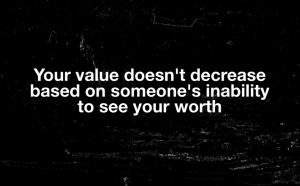 But it is mighty stupid to place your own evaluation of yourself at the mercy of others.
But it is mighty stupid to place your own evaluation of yourself at the mercy of others.
Some of my students hinge their value for themselves on the fact that they are not popular, that they are not liked. Stupid.
Some of my students hinge their value for themselves on how much money they make, how many people come to their performances, etc.
They are valid ways to look at your value, but will leave you at the mercy of others… stranded, unhappy… eventually.
This may be the reason popular entertainers, actors, grossly overpaid, have an empty life. They have one way to measure themselves… and they dare not to look at themselves in any other way… so they remain uneducated, unhappy, at the mercy of fame.
The other day I asked you to tell me if 1. you have anything to live for, and 2. if you died, people would suffer…
That was not a very popular question, because you are afraid to be measured that way. And yet, you can be measured in many different ways. This way measuring asks two questions: do you have a value of what you do for yourself? do you have a value for others?
I did get answers. 90% explained why they don’t… and 10% explained that their children would suffer.
Asking uncomfortable questions forces you to look, and decide if you’d want to change anything or not.
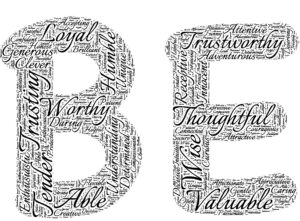 But having a fuller, bigger picture for reality makes you more intelligent, even if you don’t have the big picture capacity…
But having a fuller, bigger picture for reality makes you more intelligent, even if you don’t have the big picture capacity…
Had the blind men in the elephant story (what is an elephant) considered that the “other” is also right, they would have started to see that the picture they personally experience is part of a bigger picture.
But they weren’t more intelligent, and alas, neither are you… or most of you.
Value is only value in a certain context. Value is an answer to a question: a narrow slice of reality.
Let me give you an example: In Landmark Education, the leaders of a course are evaluated (value!) by three numbers:
1. participation: how many of the people who registered come to every session
2. how many of the participants registers (buys) into the next course
3. how many guests they bring to the public event at the end of the course.
No question, no attention, no value is given to the difference the leader makes, the lives he saves, the future that opens up for someone. Or the leader’s grace under pressure, the leader’s ease of taking people to where they need to be taken, or their ability to make people experience the course as an adventure… for example.
The value this company gives to its employees is measured in sales and selling opportunities the person causes.
High pressure… but each company decides what is their focus.
In the company called YOU, you are the CEO and you are the employee.
YOU decide what will be the criteria of evaluation of yourself.
But unless you have some criteria that you could pay attention to, you are left with your default.
Popularity, being pretty, being thin, knowing the answers, making money… all pretty default.
So, this next part, is interactive: I need your input.
Please comment, anonymously if you must, or email me if the comment box doesn’t work on your mobile. I’d like 100% participation, please.
Give me an evaluation criteria you could measure yourself by. So you could feel better about yourself, or so you could grow… either way, something other than you already use as a yardstick.
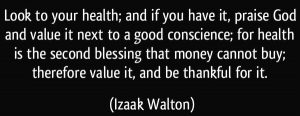 I have decided to not base my value, or the value of my teachings on what other people do with it. Because I have no control over that.
I have decided to not base my value, or the value of my teachings on what other people do with it. Because I have no control over that.
Even with the health consultations: 99% of the people are 100-200% better even after just two weeks… I consider that a feedback, but not the basis of my evaluation of myself.
And I am much happier for it.
So, let me repeat: Please comment, anonymously if you must, or email me if the comment box doesn’t work on your mobile. I’d like 100% participation, please.
Give me an evaluation criteria you could measure yourself by. So you could feel better about yourself, or so you could grow… either way, something other than you already use as a yardstick.
This is not so much for me, but for you… so you force yourself to think of a criteria, a yardstick, that allows you to be independent of others’ opinion, others’ actions, so you can like yourself, and be happier.
Really.

remember to separate your value and your work’s value. And remember the three layers of value: intrinsic, extrinsic, and systemic.
If you collapse, the result is unclarity, and unhappiness.
In the 67 steps, becoming worth a damn, we talk about extrinsic value. Intrinsically you cannot get more valuable. But extrinsically you can… Jobs pay for extrinsic value.
I thought I wasn’t doing enough to be considered as a contribution yet. Thank you for reminding me it’s the being overriding the doing of contributing.
I’m going to take on the tasks in my job and personal life as problems that need to be solved, so that I am contributing to my own growth and the movement of society.
This value exercise really helped me pull all the power to myself. I stopped assigning value to the feedback I get from my environment about me. It is actually quite stupid and dangerous to do so because everyone has their own agenda.
Hell yeah, Nancy
Thanks to all who have posted. You have really helped me see what we are doing.
My life has been lived with the feeling that I offer no value unless I am at my personal best, be it appearance, physical condition, lifestyle, raising children, career, etc.; all pretense. Otherwise, I am nothing and there is no reason to leave the house. Self-centered, leaving no potential for giving or impacting others; very small footprint. It’s been a life with more deep valleys than peaks.
But…my value lies in presence. Not achieving, not talking, no words, no writing, no action, just aware presence. When I am balanced, when I am peaceful, that is my defining criteria. There is a beautiful appreciation there that gives of itself. And after the last couple of really crazy days I have pieced together for myself, I wouldn’t have seen it, but tonight I looked, and I know, and it’s always been. And it really feels good, and when those really crazy days come again, I will BE…out of reach.
And I think it can be defined and designed to embrace all my various other facets.
except for the last sentence, it’s great. But the last sentence puts it in perspective: you consider yourself a burden unless… Didn’t you say somewhere else that you are a contribution?
The two don’t seem to be said by the same person… you being a contribution is a being, a place you come from, not the act of contributing…
Please rethink this…
I remember at some point in Landmark a manager of mine said: you don’t make a difference. And I immediately thought that if that is true, I should kill myself.
But had I been being a contribution, someone who makes a difference, just by being, it would have sounded to me like the pontification of the manager, like it really was.
When I confronted her a few years later, she was mortified. But by that time, it didn’t matter to me. I finally started to master beingness.
Take the tasks in my job and personal life as problems that need to be solved. I am solving these problems for myself in my personal life and for the company. So that I am not a burden to myself and the society.
if you need to remind yourself, then it never took as a being. Of course.
Maybe if you altered it a tiny bit and said: be present to the gift, the beauty and the light… then your life would start to have a direction, instead of doing the tiny oscillating structure of the rocking chair.
One that I already practice with is, “Am I being present?” while at work at my doorman job. Sometimes I’m not present enough to remember to ask myself. It’s easy to go into my head and make some aspect of the job wrong, or the entire job wrong, or myself wrong for being in the job.
What I notice is that if I am not present I am suffering in some way. And yet, I also resist being present for the fear that if I accept things as they are I will become complacent and never try to change or grow.
I’ve said this before, being present IS my job. When I live it as a game and a challenge, I have fun and a certain lightness. I strive to be professional and provide really good service, and maybe even earn my pay.
That is beautiful, Nev. Now, if you could just turn that into a beingness… the ground of your being, then it would be exactly the space inside which you can grow to the highest. And nothing, no feedback, no outside stuff would disturb your peace and love for yourself.
Hmmmm…another tough exercise to ponder over lol! My old/pre-existing values criteria I notice in myself is “excelling in academics means I am worthy of something/inclusion/loved/being praised etc etc and I therefore matter in life”. Awful. Mainly because it is never good enough no matter how I well I do (…and also because it is actually neediness and selfish at the core of this behavior…which I didn’t notice before until I started typing up this message!).
After looking at my life as it currently is, and the service I wish to provide to the world in the future…I guess my new criteria could be:
“Making a concerted effort to always hold a safe space efficiently enough for another so that they are allowed to share their story with me while I listen and observe without preconception/prejudice.”
I believe that this would allow me to grow in some way because the basis implies that I practice allowing, malleability and humility…especially when I don’t know what to necessarily say or do right in that moment, or when I may encounter something that is potentially difficult or seemingly goes against my own cherished beliefs.
I see that this can be easily applied to my profession…but I think this would be quite useful even in everyday life away from work as well.
you need to find something that
1. doesn’t fix anything
2. that is constant… like the light of the sun
Yes, fixing procrastination would be growth. i I think it might boost my confidence, but I didn’t say I would still love myself when things didn’t go as planned.
so what you are saying is that if you put feeling into your songs, then you will like yourself, and if you don’t then you won’t?
And how much of your time do you spend actually singing? percentage-wise? Is that what you do for work?
If not, are you going to be happy 167 hours a week, because you sang with feeling during the one hour that you sang?
Why don’t you pick something that is the bulk of your day?
ok. so that the way you want to be is proactive. Your idea is that it will bring you confidence and you’ll still love yourself when things don’t go as planned. But ultimately what you want is fix procrastinate. Am I hearing you right?
I am thinking, as part of self-development, proaction is an excellent criteria for growth; action that initiates change. Looking ahead to anticipate and prepare. Preemptive action brings confidence and will buoy me up when things don’t go as planned because I will have done my best to prepare. And proactive is the antonym for procrastinate.
A criterion I could use to judge the level of my performance is: Am I moved when I sing and play a song?
This measures several things: Am I emotionally engaged with the material when I perform it, have I mastered the technical aspects well enough that I can give me attention the the feeling and meaning that is there to be conveyed, am I performing it an emotionally engaging way? (it might be difficult to really judge that last one by myself.)